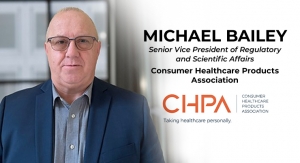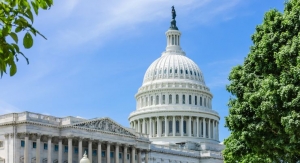Todd Harrison, Venable04.03.17
The U.S. election in November was certainly a surprise and ended one of the most controversial and disruptive elections in recent memory. The aftermath has been even more disruptive. Indeed, we have rarely seen a president so committed to being disruptive, and if the first three months of the Trump presidency are any indication, these trends will continue.
Having the federal bureaucracy shaken up may or may not be good news to individuals or companies, but there is little doubt that disruption can either be positive or negative. Certainly, overly burdensome or nonsensical regulatory schemes are of themselves disruptive, especially if they deny access to products that promote overall health and well-being. In this regard, the present regulatory structure for dietary supplements and topical products is disruptive to the overall health and well-being of consumers in the U.S.
With regard to dietary supplements, the passage of the Dietary Supplement Health and Education Act (DSHEA) was considered disruptive legislation that tied the hands of the FDA. This myth persists today. The reality, however, is that over the last 22-plus years, this legislation has become more of a negative disruption by creating a construct that has left very few barriers of entry, stymied innovation—as FDA has learned it has considerable power under DSHEA—and left consumers with less information regarding how to better their overall health.
Even worse, it creates a situation where it compels company lawyers to push the limits of credulity of the medical food category. Seriously, does anyone believe that individuals with osteoarthritis have a unique nutritional need for polyphenols? Does anyone earnestly believe “helps reduce the appearance of wrinkles” is any different than simply stating “helps reduces wrinkles”? Furthermore, does the claim “helps support normal blood sugar levels,” rather than “helps support already normal blood sugar levels,” make any sense? Does anyone believe that a simple change in the manufacturing method causes a pre-DSHEA dietary ingredient to, suddenly, become a “new” dietary ingredient? Or that changing a standardization level so the dietary supplement can be taken in one large pill, rather than one small pill, cause that ingredient to become a new dietary ingredient?
Yet, this is exactly what the present regulatory framework does. Does anyone seriously believe that after 22 years, FDA can effectively determine what was on the market prior to Oct. 14, 1994 when documents were stored in boxes and not on computer networks? Should any regulator be able to ask for all the information substantiating a claim and then simply state “our experts disagree” and attempt to force a consent judgment down a company’s throat, because the company cannot make a solid evaluation of the regulator’s evidence? Yet, that is the FTC and state investigatory practice. They take all the information in and the target company gets no feedback. Simply stated, we have a disruptive regulatory state in the natural products industry. I will spare everyone my diatribe on class action lawsuits.
Dysfunctional Framework
These are just a few of the points that a negative disruptive regulatory framework brings to us. Indeed, one could say to be careful what you ask for because you may very well get it. Well, 22-plus years later we have a dysfunctional regulatory framework that wreaks havoc in the marketplace. It deprives consumers of important information regarding a product, because we’ve decided that many of the following purported age-related issues are diseases, including, prediabetes, metabolic syndrome osteoarthritis, obesity, BPH, prehypertension, and, yes, even diabetes and hypertension that do not require medication to control. A natural topical product cannot even say “soothes diaper rash” if it doesn’t contain one of the enumerated topical OTC drugs for the treatment of diaper rash. Yet, products making these claims are readily available on the Internet. Many of them are legitimate yet others are sold by unscrupulous marketers that prey on the ignorance of consumers and stay ahead of federal and state agencies while creating a substantial stain on the natural products industry.
Unfortunately, we have developed a regulatory system that fails to recognize that natural medicine helps individuals whether the product is ingested or applied topically. Instead, we have created a system that demands expensive clinical trials for ingredients that are no longer patentable because their uses are not novel, making it unlikely such a trial will be conducted. It is a system in which courts are now allowing plaintiff attorneys to file lawsuits under state deceptive trade practices if a particular structure/function or cosmetic claim might be considered a disease claim based on the preamble to a final rule or an FDA warning letter. This is true even if the company receiving the warning letter has a legitimate position that the claim is not an impermissible disease claim.
Examples include “helps alleviate sore joints” and “helps alleviate nighttime trips in men over the age of 50” in which both claims are related to the natural progression of age. The central fact here is that as we age, our joints ache. It is part of life, but we treat it as if it were a disease. For men over 50, getting up once or twice nightly is not uncommon, and is part of the well-accepted fact that prostates grow at this stage in life. Yet, it is perceived as a disease. It is a system that has not kept up with what the public wants and legitimate companies can provide.
Innovation and legitimate products have become beholden to the constraints of the regulatory system and a heavy reliance on lawyers to bend and twist words to help communicate the real purpose of the product without running afoul of the system. It has created a vast number of gray areas between what is and what is not a permissible claim. We use claims such as “helps support blood pressure already in the normal range” when, in fact, if you have 120/80 blood pressure you do not need this product. However, if you are pre-hypertensive or at stage 1 where dietary intervention and exercise is always the initial intervention, including use of targeted dietary supplements that can help lower blood pressure sensitive to dietary intervention, this claim cannot be communicated to consumers by a company.
Probably, the more absurd situation I alluded to previously is topical natural products that cannot even make the claim “helps soothe diaper rash” unless it contains specific permitted active ingredients covered by the OTC Drug Monograph system. This makes little sense and is a waste of FDA’s enforcement time to take issue with such products, especially if the claims are substantiated.
Suggestions for Positive Disruption
By now you are asking, “How does this relate to the disruptive results of the national election? Todd, we know the regulatory system is screwed up and it’s not, necessarily, the fault of the regulators.” My point is that for the first time in a very long time, we have an administration that is open to true, positive disruption, and the industry should be thinking how to put a more sane regulatory system in place for both dietary supplements and topical natural products.
We could create a natural product monograph system and specifically preclude class action lawsuits on claims that are consistent with that monograph. For those products that don’t fit into the monograph, there should be the option to conduct a clinical study on the product, and if the results are positive, the claims should be permissible. We could setup a 510k-like system, as we currently have for medical devices, but for natural products. FDA could review the study and agree whether the study supports the claim. Within this system, we could create a process in which FDA reviews the protocol of the study first (for a reasonable fee), provides feedback, and ultimately signs off on the study design.
It should not be required to undergo the protocol review process, but if undertaken it is conducted at the company’s own risk, as medical devices do today. Clearly, however, I’m not advocating for the dismantling of DSHEA. Those who are happy with it may continue down that path. Rather, this is a system that could be in addition to DSHEA for those companies desiring to make truthful and non-misleading claims for age-related health conditions and diseases.
Regardless, there is one amendment to DSHEA we should all agree on. This is to reset the grandfathered date for ingredients under DSHEA; the amendment would require FDA to promulgate a list within one year based on labels provided by the industry. In addition, this amendment should clarify that synthetic botanicals that are truly synthetic versions of natural constituents are permissible dietary ingredients.
Finally, we should also revise the civil investigation rules for the FTC to require it to disclose in detail why it believes a company’s claims are not substantiated prior to seeking an action. It should also provide the company adequate time to respond directly to the commissioners tasked with the responsibility of deciding whether to move forward should the company decide not to settle.
These few suggestions are not intended to be all encompassing. Rather, they’re intended to be food for thought on how we may bring about disruptive legislation that would actually improve the regulatory framework and benefit American consumers. We have at least two years for out-of-the-box thinking. The question here lays in whether the industry is ready to be disruptive by proposing disruptive legislation that makes sense and will benefit everyone.
Todd Harrison
Venable
Todd Harrison is partner with Venable, which is located in Washington, D.C. He advises food and drug companies on a variety of FDA and FTC matters, with an emphasis on dietary supplement, functional food, biotech, legislative, adulteration, labeling and advertising issues. He can be reached at 575 7th St. NW, Washington, D.C. 20004, Tel: 202-344-4724; E-mail: taharrison@venable.com.
Having the federal bureaucracy shaken up may or may not be good news to individuals or companies, but there is little doubt that disruption can either be positive or negative. Certainly, overly burdensome or nonsensical regulatory schemes are of themselves disruptive, especially if they deny access to products that promote overall health and well-being. In this regard, the present regulatory structure for dietary supplements and topical products is disruptive to the overall health and well-being of consumers in the U.S.
With regard to dietary supplements, the passage of the Dietary Supplement Health and Education Act (DSHEA) was considered disruptive legislation that tied the hands of the FDA. This myth persists today. The reality, however, is that over the last 22-plus years, this legislation has become more of a negative disruption by creating a construct that has left very few barriers of entry, stymied innovation—as FDA has learned it has considerable power under DSHEA—and left consumers with less information regarding how to better their overall health.
Even worse, it creates a situation where it compels company lawyers to push the limits of credulity of the medical food category. Seriously, does anyone believe that individuals with osteoarthritis have a unique nutritional need for polyphenols? Does anyone earnestly believe “helps reduce the appearance of wrinkles” is any different than simply stating “helps reduces wrinkles”? Furthermore, does the claim “helps support normal blood sugar levels,” rather than “helps support already normal blood sugar levels,” make any sense? Does anyone believe that a simple change in the manufacturing method causes a pre-DSHEA dietary ingredient to, suddenly, become a “new” dietary ingredient? Or that changing a standardization level so the dietary supplement can be taken in one large pill, rather than one small pill, cause that ingredient to become a new dietary ingredient?
Yet, this is exactly what the present regulatory framework does. Does anyone seriously believe that after 22 years, FDA can effectively determine what was on the market prior to Oct. 14, 1994 when documents were stored in boxes and not on computer networks? Should any regulator be able to ask for all the information substantiating a claim and then simply state “our experts disagree” and attempt to force a consent judgment down a company’s throat, because the company cannot make a solid evaluation of the regulator’s evidence? Yet, that is the FTC and state investigatory practice. They take all the information in and the target company gets no feedback. Simply stated, we have a disruptive regulatory state in the natural products industry. I will spare everyone my diatribe on class action lawsuits.
Dysfunctional Framework
These are just a few of the points that a negative disruptive regulatory framework brings to us. Indeed, one could say to be careful what you ask for because you may very well get it. Well, 22-plus years later we have a dysfunctional regulatory framework that wreaks havoc in the marketplace. It deprives consumers of important information regarding a product, because we’ve decided that many of the following purported age-related issues are diseases, including, prediabetes, metabolic syndrome osteoarthritis, obesity, BPH, prehypertension, and, yes, even diabetes and hypertension that do not require medication to control. A natural topical product cannot even say “soothes diaper rash” if it doesn’t contain one of the enumerated topical OTC drugs for the treatment of diaper rash. Yet, products making these claims are readily available on the Internet. Many of them are legitimate yet others are sold by unscrupulous marketers that prey on the ignorance of consumers and stay ahead of federal and state agencies while creating a substantial stain on the natural products industry.
Unfortunately, we have developed a regulatory system that fails to recognize that natural medicine helps individuals whether the product is ingested or applied topically. Instead, we have created a system that demands expensive clinical trials for ingredients that are no longer patentable because their uses are not novel, making it unlikely such a trial will be conducted. It is a system in which courts are now allowing plaintiff attorneys to file lawsuits under state deceptive trade practices if a particular structure/function or cosmetic claim might be considered a disease claim based on the preamble to a final rule or an FDA warning letter. This is true even if the company receiving the warning letter has a legitimate position that the claim is not an impermissible disease claim.
Examples include “helps alleviate sore joints” and “helps alleviate nighttime trips in men over the age of 50” in which both claims are related to the natural progression of age. The central fact here is that as we age, our joints ache. It is part of life, but we treat it as if it were a disease. For men over 50, getting up once or twice nightly is not uncommon, and is part of the well-accepted fact that prostates grow at this stage in life. Yet, it is perceived as a disease. It is a system that has not kept up with what the public wants and legitimate companies can provide.
Innovation and legitimate products have become beholden to the constraints of the regulatory system and a heavy reliance on lawyers to bend and twist words to help communicate the real purpose of the product without running afoul of the system. It has created a vast number of gray areas between what is and what is not a permissible claim. We use claims such as “helps support blood pressure already in the normal range” when, in fact, if you have 120/80 blood pressure you do not need this product. However, if you are pre-hypertensive or at stage 1 where dietary intervention and exercise is always the initial intervention, including use of targeted dietary supplements that can help lower blood pressure sensitive to dietary intervention, this claim cannot be communicated to consumers by a company.
Probably, the more absurd situation I alluded to previously is topical natural products that cannot even make the claim “helps soothe diaper rash” unless it contains specific permitted active ingredients covered by the OTC Drug Monograph system. This makes little sense and is a waste of FDA’s enforcement time to take issue with such products, especially if the claims are substantiated.
Suggestions for Positive Disruption
By now you are asking, “How does this relate to the disruptive results of the national election? Todd, we know the regulatory system is screwed up and it’s not, necessarily, the fault of the regulators.” My point is that for the first time in a very long time, we have an administration that is open to true, positive disruption, and the industry should be thinking how to put a more sane regulatory system in place for both dietary supplements and topical natural products.
We could create a natural product monograph system and specifically preclude class action lawsuits on claims that are consistent with that monograph. For those products that don’t fit into the monograph, there should be the option to conduct a clinical study on the product, and if the results are positive, the claims should be permissible. We could setup a 510k-like system, as we currently have for medical devices, but for natural products. FDA could review the study and agree whether the study supports the claim. Within this system, we could create a process in which FDA reviews the protocol of the study first (for a reasonable fee), provides feedback, and ultimately signs off on the study design.
It should not be required to undergo the protocol review process, but if undertaken it is conducted at the company’s own risk, as medical devices do today. Clearly, however, I’m not advocating for the dismantling of DSHEA. Those who are happy with it may continue down that path. Rather, this is a system that could be in addition to DSHEA for those companies desiring to make truthful and non-misleading claims for age-related health conditions and diseases.
Regardless, there is one amendment to DSHEA we should all agree on. This is to reset the grandfathered date for ingredients under DSHEA; the amendment would require FDA to promulgate a list within one year based on labels provided by the industry. In addition, this amendment should clarify that synthetic botanicals that are truly synthetic versions of natural constituents are permissible dietary ingredients.
Finally, we should also revise the civil investigation rules for the FTC to require it to disclose in detail why it believes a company’s claims are not substantiated prior to seeking an action. It should also provide the company adequate time to respond directly to the commissioners tasked with the responsibility of deciding whether to move forward should the company decide not to settle.
These few suggestions are not intended to be all encompassing. Rather, they’re intended to be food for thought on how we may bring about disruptive legislation that would actually improve the regulatory framework and benefit American consumers. We have at least two years for out-of-the-box thinking. The question here lays in whether the industry is ready to be disruptive by proposing disruptive legislation that makes sense and will benefit everyone.
Todd Harrison
Venable
Todd Harrison is partner with Venable, which is located in Washington, D.C. He advises food and drug companies on a variety of FDA and FTC matters, with an emphasis on dietary supplement, functional food, biotech, legislative, adulteration, labeling and advertising issues. He can be reached at 575 7th St. NW, Washington, D.C. 20004, Tel: 202-344-4724; E-mail: taharrison@venable.com.




























